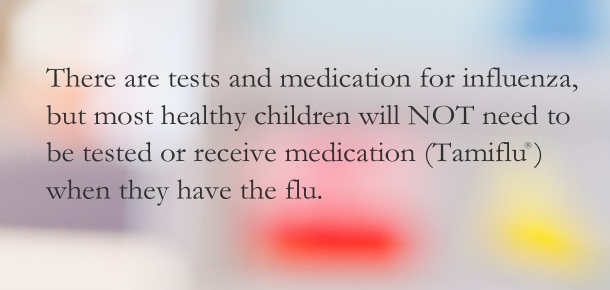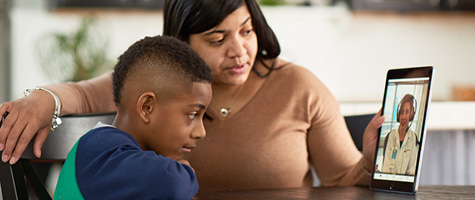We are currently seeing an increase in patient visits at our Emergency Department (ED) and Urgent Care locations. This is due to various respiratory and stomach viruses and other seasonal illnesses in the community.
If your child is ill, please start with a phone call or visit to your child’s physician. He or she can help you determine the best next steps for care.
We have been receiving an influx of questions related to the flu, so we thought it would be helpful to answer some of those more frequently asked questions below:
Q1: When should I take my child to the ER for influenza or other seasonal illnesses?
A: It is always best to start with your child’s doctor to determine the best course of action. However, the following symptoms are potential signs that your child needs to make a trip to the emergency room:
– Breathing fast or having trouble breathing.
– Your child’s skin color is blue or gray
– Your child will not drink liquids and looks dehydrated
– Your child had flu symptoms that got better, but then came back with a fever or a worse cough.
If you need a refresher on when to take your child to the Emergency Department versus Urgent Care, this link provides suggestions.
Q2: Will my child be tested for the flu at Cincinnati Children’s?
A: In otherwise healthy children, no, we do not typically test for the flu. In certain circumstances, such as in patients who are severely ill, hospitalized, pregnant, or under two years of age, we will most likely administer testing for influenza.
Q3: Why are some patients receiving treatment for the flu and others are not?
A: Some patients will be treated with medication such as Tamiflu for influenza, others will not. Typically those patients who fall into a high risk group – such as patients who have certain chronic medical conditions, those who are severely ill or hospitalized, some patients under the age of two, as well as patients who are pregnant – will receive medication because they are at high risk for complications related to the flu and will have a more difficult time recovering. It is not recommended for otherwise healthy children to receive this medication because most cases of influenza are mild and your child should recover without it. There is also potential for a patient to develop resistance to the drug, meaning that it may not be as effective if it is needed in the future for a more severe case.
Please be sure to review your child’s medical history closely with your nurse or doctor to make sure that your child is not in a high risk group.
Q4: How can I help my sick child at home?
A: Make sure your child is getting enough fluids and rest. Give your child access to Pedialyte and other liquids. Encourage frequent, small sips. Keep track of how much your child is drinking. You should seek medical care if your child appears dehydrated. Symptoms of dehydration include sunken eyes, not making tears when crying, decreased activity and urination, pale skin color, and dry mouth.
Q5: Should I give my child cough, cold, or diarrhea medications?
A: No over the counter cough, cold, or anti-diarrheal medications should be given. They have not been proven to be helpful, and some of them are dangerous. Give only acetaminophen and ibuprofen as recommended by your doctor.
Q6: What should I do if my other child becomes ill?
A: Provide supportive care, such as what’s described in Q4, and seek medical attention only if a complication arises. You can help prevent the spread of illness within your household by: washing your family’s hands frequently and getting the flu shot – it isn’t too late! Learn more about this year’s flu season.
Q7: How long should I keep my sick child at home?
A: If your child is sick with a flu-like illness, he or she should stay home for at least 24 hours after the fever is gone without the aid of fever-reducing medications. Keep your child away from others as much as possible to prevent the spread of the illness.
Q8: What is Cincinnati Children’s doing to protect patients from the flu?
A: Cincinnati Children’s requires all staff to be immunized against influenza. In addition, there is a very active immunization program for our high-risk patients. We also offer free vaccine, especially for families with children who have long hospital stays for serious illnesses. In addition, when respiratory pathogens, including influenza, are widespread in the community, we restrict visitors in an attempt to keep kids form catching the flu while hospitalized and extending their stay with us. Those visitor restrictions officially began December 10 because of flu activity in the community. Here is more information about our winter visitor restrictions.
If your child’s physician suggests you head to Urgent Care, you can check wait times before you get there: TEXT “ccurgent” to 437411 or visit the Urgent Care information page.
Wait times for families are significantly longer than normal at all of our ED and Urgent Care locations. We are working as hard as we can to see kids in a timely manner, but need to ask for your patience and understanding during the next few weeks.
If you’re visiting one of our EDs, our staff will determine how urgent your child’s care is. We treat those with life-threatening issues first, but that does not mean that your child is not important! We will work as fast as we can to safely treat your child and those around you. Most children we are currently seeing for flu do not need testing or treatment, such as Tamiflu. See questions below for more info on this topic.
Please also prepare to be here for several hours. For either ED or Urgent Care, bring coloring books and crayons, books, small toys – anything you might need to help your child be comfortable while you wait.
We apologize for this inconvenience as we know lengthy wait times can be difficult, but hope you will not delay care because you may have to wait.
It is difficult to anticipate how long it will take for patient volumes to return to typical. I assure you, we are working behind the scenes to adjust where we can to help your family see a care provider as quickly as possible and we will continue to do that until illness activity returns to normal levels in our community. We thank you in advance for your patience.






My nephew in law Jeff Ushupin, MD., shared this link. Saw your name. I was head nurse in CRC in late 70s. Remember you as a nice person. Enjoy your grandkids.